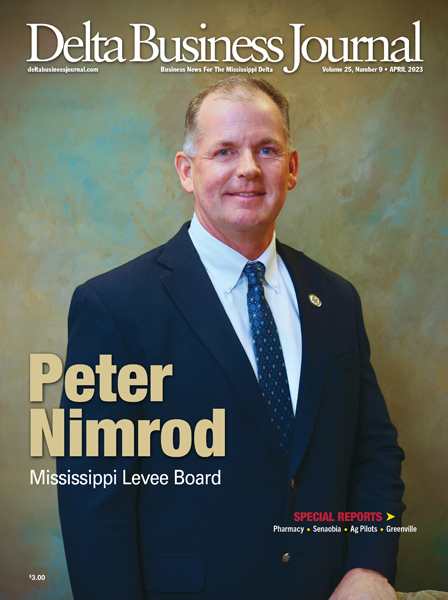Mississippi Levee Board Chief Engineer
Guides With Sure, Steady Leadership
By Jack Criss • Photography by Johnny Jennings
Leading one of the most important organizations based in the Mississippi Delta, Peter Nimrod brings concern for his constituents and extensive knowledge to his position as Chief Engineer of the Mississippi Levee Board based in Greenville. This becomes apparent in conversation with him as he always turns discussion of his personal career to the accomplishments of his Board members and staff.
Having moved to Greenville at the age of two months from Columbus, Indiana, Nimrod has always considered himself a Delta native.
“My dad, Vance Nimrod, was a mechanical engineer who had gotten his MBA from Dartmouth and was working for Cummins Engine Company when he moved to Greenville, Mississippi for a one year assignment to work at Delta Foundation,” says Nimrod. “My mom and dad met while at Iowa State University where my mom, Jean Ann, got a degree in Journalism, a Masters in Theology and was an accomplished artist. They were married for sixty years until my mom passed away last year. But both of my parents loved Greenville very much which is why they decided to stay and live here for the rest of their lives.” Nimrod’s father still lives in Greenville.
Nimrod and his sister, Alison, had typical childhoods, he says.
“My ambition, as a kid growing up in the 80s, was to be a professional baseball player until I realized I wasn’t quite good enough,” laughed Nimrod. “I loved and played sports all throughout high school and graduated from St. Joe in Greenville in 1988.”
Leaving the Delta for college, Nimrod graduated in 1992 Magna Cum Laude from Auburn University with a degree in Civil Engineering and he was inducted into Phi Kappa Phi, Tau Beta Pi and Chi Epsilon honor societies.
“I had worked at W.L. Burle Engineers in Greenville when I was in high school, during every summer,” says Nimrod. “When I first arrived at Auburn, I thought I wanted to be an architect. But, after walking out of a presentation/orientation by the Dean of the Architectural School I headed straight for the Engineering School building and never looked back!”
Nimrod loved Auburn and the time he spent there.
“We have great schools here in Mississippi, without a doubt,” he says. “However, Auburn was the right fit for me. It was a great town and I couldn’t have gotten a better education. Those were good times.”
Returning to Greenville after graduation, W.L. Burle offered Nimrod a full-time job as a consulting engineer, receiving his professional engineering and professional land surveying licenses while working at the firm.
“Then, in 1999, Bobby Thompson, who I work with today at the Levee Board, told me they were looking for an Assistant Engineer. So, I ended up meeting with then Chief Engineer, Jim Wanamaker, and met with the Levee Board at the time and was offered the job late that year, starting in November. Looking back now, it’s hard to believe I’ve been here this long,” says Nimrod.
Jim Wanamaker had already made his plans to retire from the Levee Board in 2004, so Nimrod was aware early on that he was being groomed to step in and take over as Chief Engineer. Nimrod says he couldn’t have asked for a better person to learn the ropes from.
“Jim was a great boss, mentor and friend,” says Nimrod. “I learned so much under his leadership. So, I was more than prepared to take over his position in 2004 all because of the tutelage he provided.”
“I knew Peter before he was hired at the Levee Board,” says Wanamaker. “And, I could see that he was a perfect fit for us. He did a good job, is very thorough and capable and there was no doubt he would be a strong replacement when I retired. I consider him a friend. He just talks too fast at his presentations!”
Looking back over his nearly twenty years as Chief Engineer of the Mississippi Levee Board, Nimrod says many things stand out.
“Of course, everyone in the Delta is aware of the work we’ve done to get the Yazoo Backwater Pump project in place, that’s pretty well documented,” he says. “But, to me, the massive 2011 Mississippi River flooding event, the worst we’d seen since the historic 1927 flood, will always stand out in my mind. It was the first real test of our levee systems since 1927. And, while it was an incredibly tough time, it was a triumph for us in many ways. The scope of that flooding event in 2011 underscored to us what corrective measures needed to be put in place going forward. We worked closely with the U.S. Army Corps of Engineers to design and implement permanent solutions to eleven significant problems that emerged during the 2011 flood. So, by the end of 2015, we had those solutions in place which, in retrospect, was perfect timing: from 2016 through 2020 we had additional, historic long term flooding on the River—major events. And, it was awesome to see that, even during that time period, we never had any significant problems. The work we had done after 2011 turned out to be the permanent solutions we thought they could be. I consider that the high point, or points, of my tenure here.”

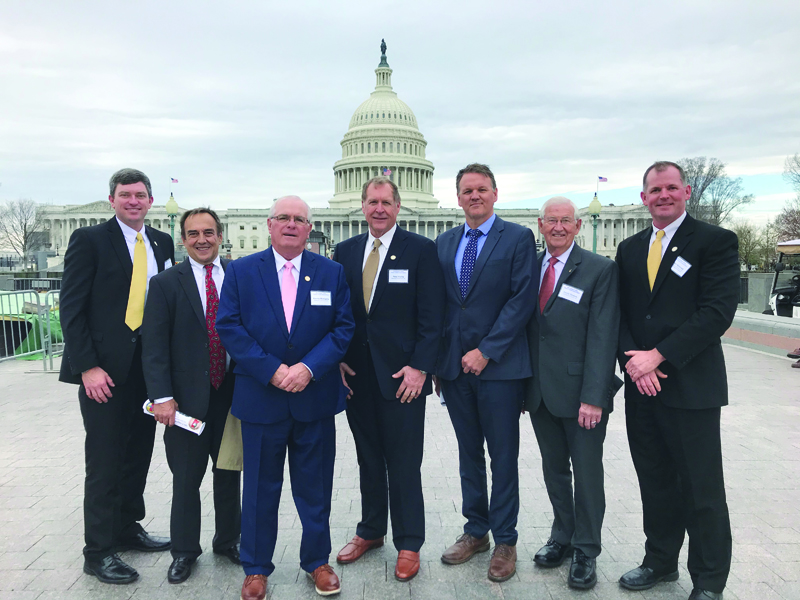
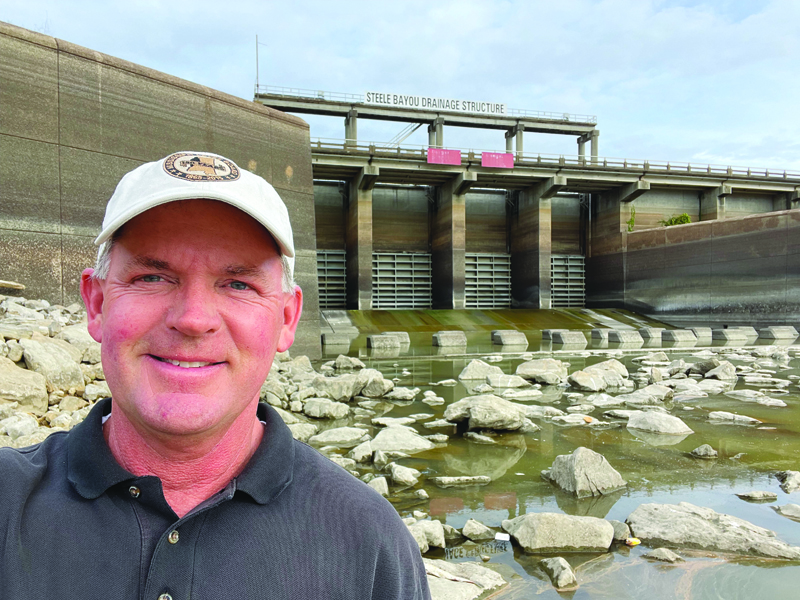
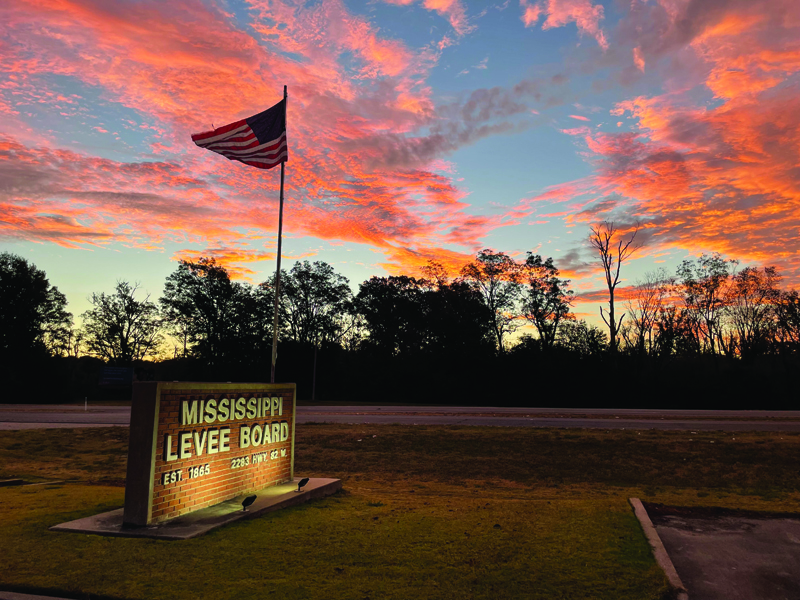
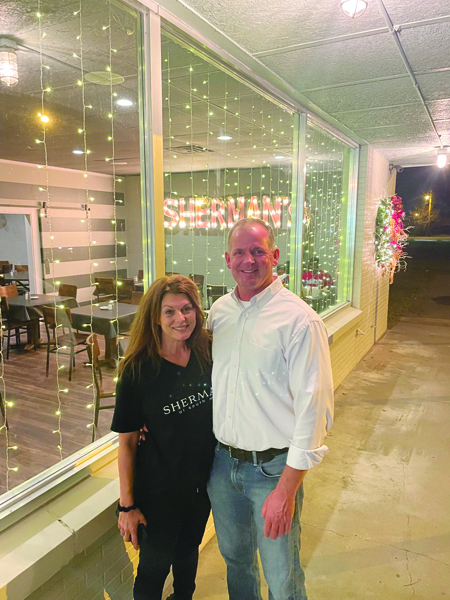
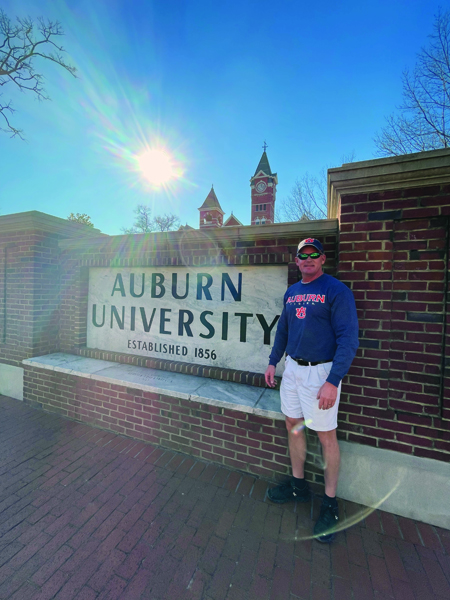
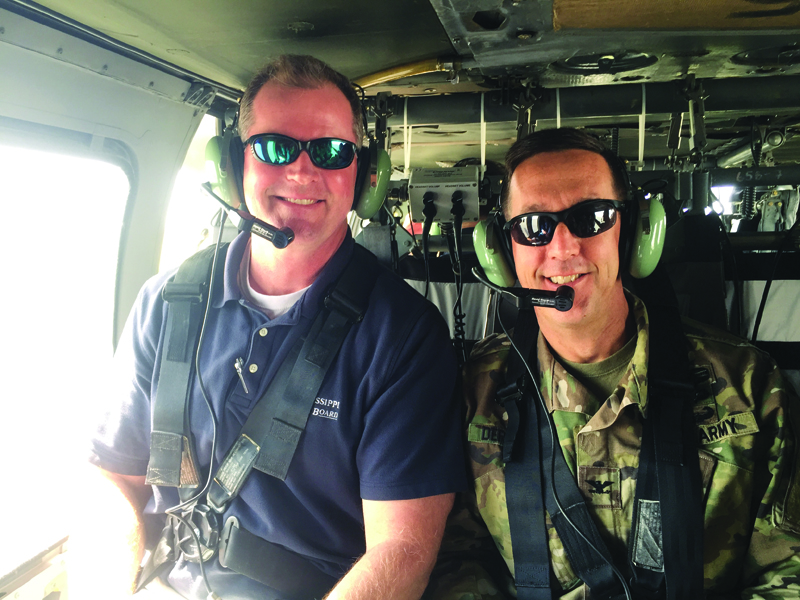
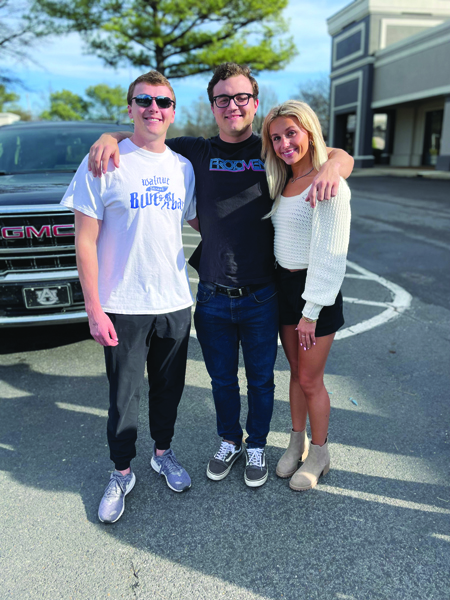
Nimrod is also proud of the work the Board has completed with its levee enlargement jobs which started in 1998 just before he started at the Levee Board.
“We had identified seventy-five miles of deficient levees along the Mainline Mississippi River Levee since the major flood in 1973,” says Nimrod. “And, as of now, we have raised 50.5 of those with another 12.8 currently under contract to be raised. So, yes, I’m very proud and excited about our work on getting that completed.”
Nimrod also points to the 2019 Backwater Flood, a catastrophic event that took a severe toll on the Levee Board’s coverage area, as a major turning point to which the Levee Board responded admirably.
“The water got to 98.2 feet,” he recalls, “with 550,000 thousand acres underwater that resulted in 231,000 acres of cropland that never got planted, 686 houses flooded, three highways were underwater—it was eye-opening. Still, with that tragedy I think we emerged better and stronger. The pumps looked like they were finally on their way to be completed, having been authorized many years ago—but, in the fall of 2021, the Environmental Protection Agency stepped in and vetoed the project once again. Last year, though, the Biden Administration, the Corps and even the EPA were on track, working hand in hand, to finally get it approved. And I have to give so much credit to the people of the South Delta and their passionate pleas, diligence and persistence—being the faces and voices for the pumps. I think D.C. is finally beginning to see the light. We’re close now to getting this project implemented—we should know something positive this spring.”
In regard to the seven Board members he works for, Nimrod says, “Honestly, I have been the luckiest guy in the world to have extraordinary people—past and present—along on this journey with me. They are highly conscientious and dedicated to their jobs and doing the right thing. Certainly, the members have different opinions about certain topics. But, at the end of the day, they work together and reach a compromise that will best benefit our constituents. I can’t say enough about this Board.”
Nott Wheeler, who has represented Bolivar County as a Commissioner on the Board for twenty-nine years, says, “I tell everybody this: I think the Lord sent Peter Nimrod to us. I was on the personnel committee that hired Peter back in 1999 and we could tell right away that he was the one. He’s never disappointed us. Jim Wanamaker was so well-respected and Peter has been, too. He has the most amazing memory for detail, facts and figures—it’s astounding—and he presents himself so well, both to the public and to public officials.”
Nimrod also gives credit to his two Assistant Engineers, the aforementioned Bobby Thompson, and Dustin Herman, as well as secretary, Ginger Molino, who has been with the Levee Board for almost thrity years.
“We also have our treasurer, Rachel McIntire, who is CPA and has done a great job, and Steve Poole, who heads up our maintenance crew—just a great group of people and staff who are totally committed to their jobs,” says Nimrod.
Nimrod and his wife, Allison, married in 2001 and have three children: Peter’s stepson, Dillon Smith, who works in the computer science industry in the Nashville area, as well as son, Paxton, who just finished at Ole Miss and is now in dental school at the University of Tennessee in Memphis, and daughter, Brantley, who graduates this year from Washington School in Greenville and will go to Ole Miss in the fall to study Biology.
Nimrod and Allison bought the landmark Greenville restaurant, Sherman’s, in 2012.
“Allison had been in business for herself in the medical industry,” he says, “but had worked in the food industry business in the past and had loved it. So, she talked to Charles Sherman in 2012 and we purchased the business that same year. Allison runs the day-to-day operations and I come in later in the day and help close out, do repairs, whatever Allison needs.”
The restaurant was rebuilt and renamed Sherman’s at South Main after the original structure burned down in January of 2021.
“There was never any hesitation, even after that tragedy,” says Nimrod. “We bought another building on South Main, renamed the restaurant, and reopened later that same year. And, it’s been great. It’s a bigger space and a better atmosphere. We love seeing and serving people and it’s a great fit for both me and Allison. The staff is like family to us, twenty-five people who depend on the restaurant for a living, and they’re terrific folks.”
The restaurant was featured on noted chef Gordon Ramsey’s nationally-syndicated program, “24 Hours To Hell And Back’’ in 2017, as many recall, and Nimrod says the man is actually like he is on television.
“Very intense, very Type-A,” he says. “And, while he did make some great suggestions and additions, after the show aired in 2018 it hurt our business for a while. But, we bounced back and I think that’s a distant memory now.”
When not working nearly all the time, Nimrod and Allison are members of St. James Episcopal Church in Greenville.
“I’ve been there all of my life,” he says. And Nimrod is heavily involved in several professional engineering groups in the Delta. He is also an avid, longtime tennis player and has now even taken up playing the game sweeping the world, pickle ball.
Nimrod embodies the best of Delta leadership and does so in a field that touches so many lives.
“I love my job and I want to end my career here—but not anytime soon,” he laughs. “I think I’m making a difference here.”
For more information about ARS, visit www.ars.usda.gov.

